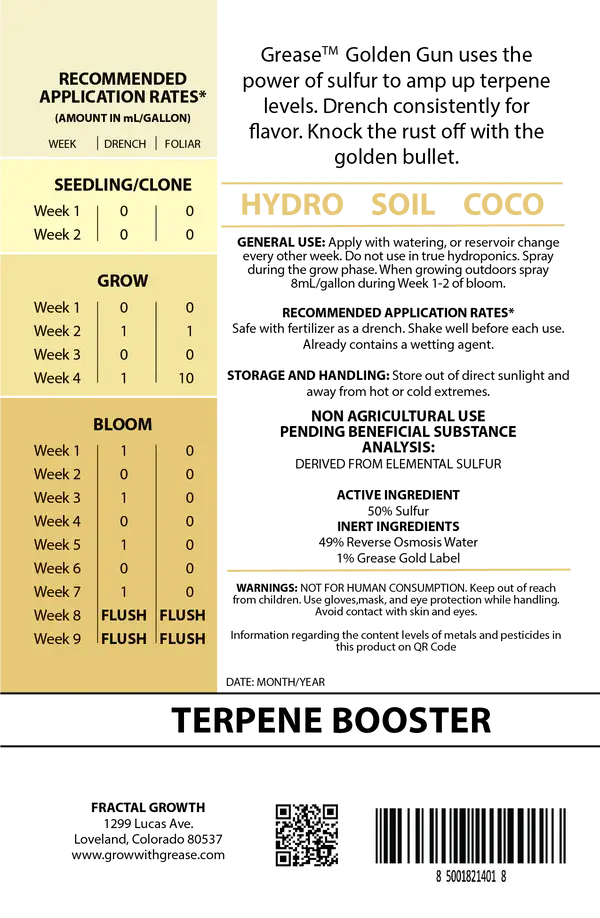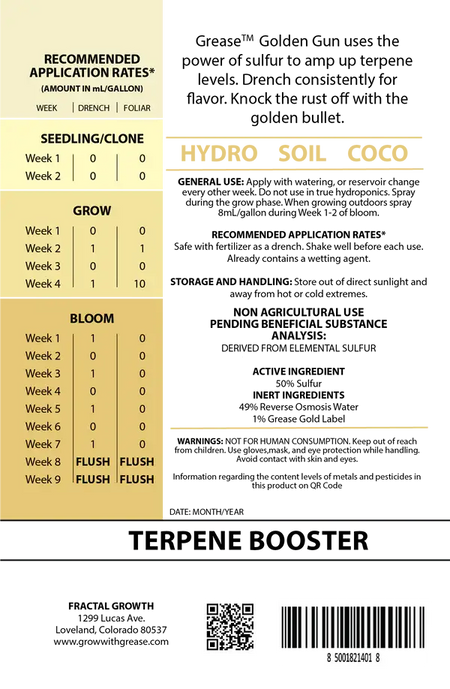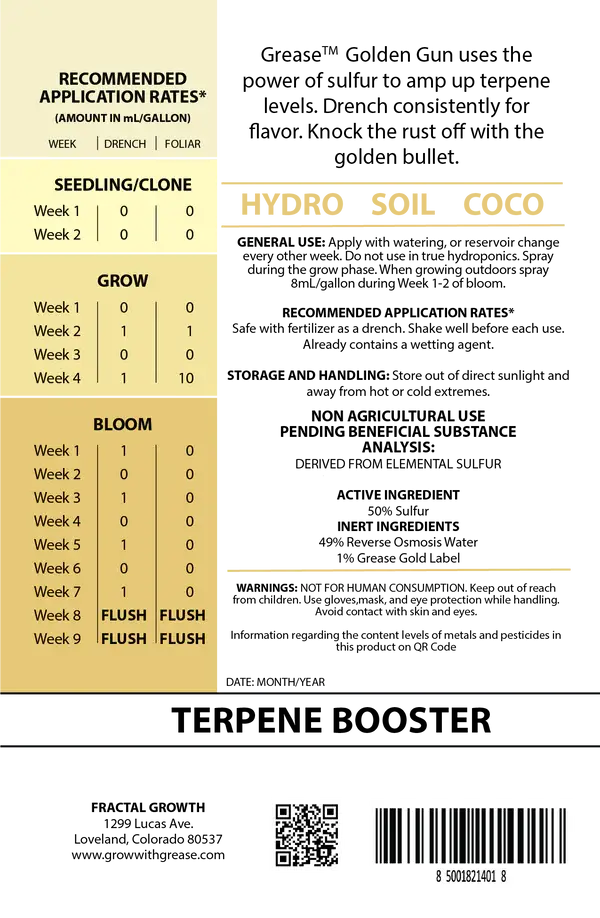GREASE™
Golden Gun Nano Sulfur (Terpene Booster)
Harness the elemental power of sulfur to increase terpenes. Grease Golden Gun uses the power of sulfur to amp up terpene levels. Drench consistently for flavor. Knock the rust off with the golden bullet. Sulfur is an essential plant nutrient that plays a vital role in various biochemical processes within plants. It is involved in the synthesis of proteins, enzymes, vitamins, and other important compounds. When it comes to terpene production, sulfur availability can have a significant impact.
-
Precursor for Terpene Synthesis: Terpenes are a diverse group of compounds responsible for the characteristic aromas and flavors of plants. They are derived from isoprene units, which are built from the basic precursor isopentenyl diphosphate (IPP). Sulfur is required for the synthesis of IPP and its conversion into other terpene compounds. Adequate sulfur availability ensures a sufficient supply of IPP, which can lead to increased terpene production.
-
Activation of Enzymes: Sulfur is involved in the activation of enzymes responsible for terpene biosynthesis. It helps in the formation and activity of key enzymes, such as terpene synthases, which catalyze the conversion of IPP into specific terpene compounds. Sulfur acts as a cofactor for these enzymes, enabling them to function optimally and enhance terpene production.
-
Regulation of Gene Expression: Sulfur can influence the expression of genes involved in terpene biosynthesis. It acts as a signaling molecule, triggering the upregulation of genes responsible for terpene production. Sulfur deficiency can lead to downregulation of these genes, resulting in reduced terpene synthesis. By ensuring an adequate supply of sulfur, the expression of terpene-related genes can be enhanced, leading to increased terpene levels.
-
Enhanced Secondary Metabolism: Sulfur availability influences the overall metabolism of plants, including secondary metabolites like terpenes. Adequate sulfur levels promote an optimal balance of primary and secondary metabolism, ensuring that resources are allocated towards terpene synthesis. Sulfur deficiency can disrupt this balance and redirect resources towards other metabolic pathways, potentially leading to decreased terpene production.
-
Defense Mechanisms: Terpenes play a crucial role in plant defense against herbivores, pathogens, and environmental stresses. They can act as natural repellents, toxins, or antimicrobial agents. Sulfur availability can influence the production of terpenes involved in plant defense mechanisms, enabling plants to respond more effectively to stressors and threats. By providing sufficient sulfur, plants can enhance their ability to produce terpenes with defensive properties.
-
Plant Nutrition: Sulfur is an essential nutrient for plant growth and development. It plays a vital role in the synthesis of proteins, enzymes, and chlorophyll, contributing to overall plant vigor and vitality. Sulfur provides a supplementary source of sulfur to plants, ensuring they have an adequate supply of this essential nutrient. Sulfur deficiency can lead to stunted growth, yellowing of leaves, and reduced crop yields.
-
pH Adjustment: Sulfur can help regulate soil pH levels. It is commonly used to lower soil pH in alkaline soils, making them more acidic and creating a favorable environment for plants that prefer slightly acidic conditions. By adjusting the soil pH, Sulfur can improve nutrient availability and uptake by plants, enhancing their overall health and growth.
-
Environmentally Friendly: It is a naturally occurring substance and does not persist in the environment or pose significant risks to humans, animals, or beneficial insects when used correctly. It offers an alternative to synthetic pesticides and chemical treatments, promoting sustainable and organic farming practices.
- It's important to note that while sulfur is essential for terpene production, other factors such as genetics, environmental conditions, and overall plant health also play a role in terpene levels. Additionally, the specific effects of sulfur on terpene production may vary depending on the plant species and the specific terpene compounds involved. Optimal sulfur fertilization practices should be determined based on plant requirements, soil conditions, and local recommendations.

























